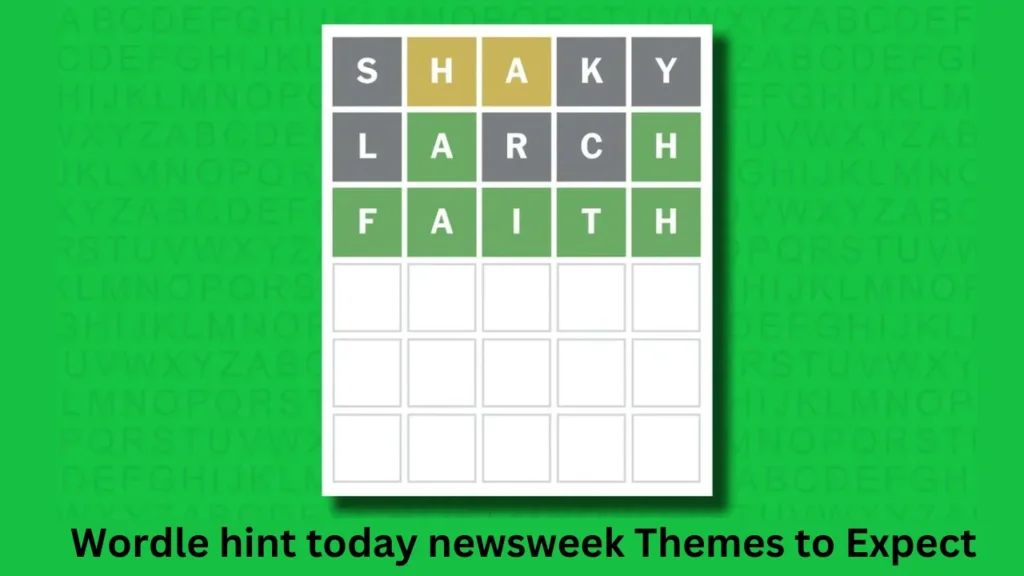Wordle has become an internet sensation, capturing the attention of millions who eagerly anticipate the release of a new puzzle each day. The game’s simplicity and addictive nature have made it a daily ritual for many. As a result, terms like Wordle hint today Newsweek have gained popularity among players seeking subtle clues without directly revealing the solution. This article delves into why people seek these hints, how they impact the game, and what to expect from sources like Newsweek.
What Is wordle hint today newsweek
Wordle is a word puzzle game where players have six attempts to guess a five-letter word. Each guess provides feedback through colored tiles indicating if a letter is in the correct position, present but misplaced, or not in the word at all. This combination of challenge and simplicity has led to the game’s viral success.
For those new to the game, the objective is straightforward: guess the correct word within the given tries. As players progress, they develop strategies to eliminate incorrect letters and positions, increasing their chances of finding the right word.
Why Are Wordle Hints Important
As the game gained traction, many players began looking for ways to improve their chances. This is where “Wordle hint today Newsweek” comes into play. Hints offer a nudge in the right direction without completely spoiling the answer. For many, this balance between assistance and challenge keeps the game enjoyable.
Hints often include:
Starting Letters:
Suggestions for which letters to use at the beginning.
Common Patterns:
Guidance on frequent letter combinations in English.
Letter Exclusions:
Indicating letters that are unlikely to be in the word.
These hints are especially useful for those who find themselves stuck but still want to maintain a level of difficulty.
The Role of wordle hint today newsweek
Newsweek, a popular news outlet, has started offering daily hints for Wordle enthusiasts. The concept of “Wordle hint today Newsweek” emerged as a trusted source for these clues, attracting players looking for reliable and well-thought-out tips. Newsweek’s approach is unique because it provides hints in a structured format, making it easy for readers to understand and apply the information without directly revealing the word.
Newsweek usually offers the following types of hints:
Clues About the Word’s Nature:
This could include information on whether the word is a noun, verb, or adjective.
Hints on Word Length and Structure:
Although Wordle words are always five letters, these hints can focus on the internal structure, like double letters or unusual patterns.
Guidance on Common Mistakes:
Newsweek might highlight common pitfalls that players fall into, helping them avoid unnecessary errors.
How to Use Wordle Hints Effectively
While hints can be helpful, using them effectively requires a strategy. Here are some tips on making the most out of your Wordle hint today Newsweek:
Don’t Rush to the Hint Immediately:
Try a few guesses based on your instincts. This will help you get a feel for the puzzle.
Use Hints Sparingly:
Overreliance on hints can diminish the challenge. Use them when you’re genuinely stuck.
Analyze Your Guesses:
Compare your guesses with the hints provided. This helps in understanding how to approach future puzzles.
Combine Hints with Letter Elimination:
If the hint suggests certain letters, focus on eliminating others. This dual approach increases the chances of solving the puzzle.
Wordle Hints on Gameplay
The inclusion of hints like “Wordle hint today Newsweek” has stirred debate within the Wordle community. Purists argue that hints reduce the challenge, while others believe they make the game accessible to a broader audience. Regardless of the stance, it’s clear that hints have become a significant part of the Wordle experience.
For those who enjoy a challenge, using hints sparingly or only as a last resort can maintain the game’s original difficulty. Conversely, players who find the game too challenging may find hints essential in keeping their interest alive.
A Day in the Life of a Wordle Player
To better understand how hints fit into the daily routine of a Wordle enthusiast, let’s look at a typical day:
Morning Ritual:
Players start their day by opening the game, eager to tackle the new puzzle.
Initial Guesses:
They try a few words, often common starting choices like “raise” or “table.”
Stuck Phase:
If progress stalls, they turn to hints like “Wordle hint today Newsweek” for guidance.
Hint Application:
Players use the hint to adjust their guesses, either incorporating or excluding suggested letters.
Solution or Retry:
They either solve the puzzle, feeling a sense of accomplishment, or continue experimenting with different words.
Wordle Hints grow in popularity
As Wordle continues to grow in popularity, the demand for quality hints will likely increase. Platforms like Newsweek are setting a precedent for how these hints should be presented—structured, informative, and spoiler-free. We can expect more media outlets to join this trend, offering their take on the perfect hint format.
Moreover, the concept of “Wordle hint today Newsweek” might evolve to include additional features, such as interactive hint tools or community-driven hint sharing. This could foster a more collaborative environment among players, where hints are seen as a learning tool rather than a shortcut.
| Strategy | Description |
|---|---|
| Starting Letters Approach | Focus on the first letter of the word based on hints. |
| Pattern Recognition | Use hints to identify common letter patterns like double vowels or consonants. |
| Process of Elimination | Exclude letters not suggested in the hints to narrow down options. |
| Hint Timing | Use hints only after a few failed attempts to retain the challenge. |
| Cross-Referencing Sources | Compare hints from multiple sources to get a broader perspective. |
Wordle hint today newsweek Themes to Expect

If you’ve been playing Wordle for a while, you may have noticed that certain themes appear repeatedly. Newsweek’s Wordle hints often align with these themes to guide you in recognizing the type of word you’re dealing with. Understanding these themes can significantly improve your gameplay and increase your chances of guessing the correct word. Here are some common themes you might encounter in the hints provided by Newsweek:
Everyday Objects
Many Wordle words relate to items you see or use daily, such as tools, household items, or foods. When Newsweek provides hints about common objects, they usually describe items that are familiar and easy to think of. For example, the hint might indicate that the word is something found in a kitchen or a tool commonly used in the garden. This kind of hint narrows down your options to simple five-letter words you might use regularly.
Example Hints:
“A tool often used for cutting” could lead to words like “knife” or “shear.”
“Something you drink from” might direct you to words like “glass” or “mug.”
Recognizing that the word is an everyday object can help you focus your guesses on more specific terms, increasing the likelihood of finding the right answer.
Nature and Animals
Another common theme in Wordle puzzles is nature and animals. These words can range from animal names to terms related to plants or natural features like mountains and rivers. Hints related to this theme might mention if the word is an animal, plant, or any natural element, helping you direct your guesses toward these categories.
Example Hints:
“A type of tree” could lead you to guess words like “birch” or “oak.”
“A five-letter animal” might prompt guesses like “tiger” or “zebra.”
Knowing that the word is related to nature can significantly reduce the number of potential guesses, making it easier to crack the puzzle.
Actions and Verbs
Wordle puzzles often revolve around actions or verbs, which are words that describe what someone or something does. Newsweek may offer a hint suggesting that the word is an action, which can guide you toward verbs. This theme is particularly helpful because it narrows down the options to a specific type of word, making it easier to guess the correct answer.
Example Hints:
“An action you do with your hands” could lead you to words like “clap” or “grasp.”
“Something you do when you’re tired” might direct your guesses to words like “yawn” or “sleep.”
Focusing on verbs as potential solutions can streamline your thought process, helping you arrive at the right word faster.
Feelings and Emotions
Occasionally, the Wordle word will relate to a feeling or emotion. These words are a bit trickier because they are less concrete than objects or actions. However, if Newsweek hints that the word is associated with an emotion, you can narrow your guesses to feelings like “happy” or “angry.” This type of hint helps you think in abstract terms, making the game more challenging yet intriguing.
Example Hints:
“A feeling of joy” could lead you to guess words like “elated” or “happy.”
“Something you feel when scared” might prompt guesses like “afraid” or “tense.”
Understanding that the word is related to emotions can help you avoid more literal guesses and focus on more abstract terms.
Improving Your Wordle Game Over Time
Using hints like “Wordle hint today Newsweek” is a great way to enhance your Wordle experience. However, improving your skills over time is the real key to becoming a Wordle master. As you continue playing and using hints, you’ll start to notice patterns and letter combinations that frequently appear in the game. Below are some strategies to help you become a Wordle expert:
Learn Common Letter Combinations
In English, certain letter combinations are more common than others. For instance, pairs like “th,” “sh,” and “ch” are frequently used, as are vowel combinations like “ea” and “oo.” Familiarizing yourself with these combinations will make it easier to guess words that fit the given hints and improve your overall success rate.
Expand Your Vocabulary
The more words you know, the better you’ll perform at Wordle. Reading regularly, doing crossword puzzles, and using vocabulary-building apps are excellent ways to expand your word bank. The broader your vocabulary, the easier it will be to think of potential words for each puzzle.
Practice Makes Perfect
Wordle is a game that rewards practice. The more puzzles you solve, the better you’ll become at recognizing word patterns and coming up with solutions. Set a goal to play every day and challenge yourself to improve. Over time, you’ll develop a natural sense for the types of words that are commonly used and be able to guess them more quickly.
Frequently Asked Questions
How does Newsweek provide Wordle hints?
Newsweek offers daily Wordle hints by describing the nature of the word, such as whether it is a noun, verb, or related to a specific theme like nature or emotions. These hints are designed to help players without revealing the answer directly.
Can I solve Wordle puzzles without hints?
Yes, many players enjoy solving Wordle puzzles without hints to maintain the challenge. However, hints can be a helpful resource if you’re stuck or just want to improve your gameplay strategy.
Are Wordle hints from Newsweek accurate?
Yes, Newsweek’s Wordle hints are carefully crafted to guide players in the right direction. They are accurate and reliable, providing clues that enhance the puzzle-solving experience without spoiling the fun.
Final Thoughts
Whether you’re a seasoned Wordle player or a newcomer, using resources like Wordle hint today Newsweek can enhance your gameplay experience. Recognizing common themes and understanding how to apply hints effectively will not only make the game more enjoyable but also improve your chances of solving each puzzle successfully.
